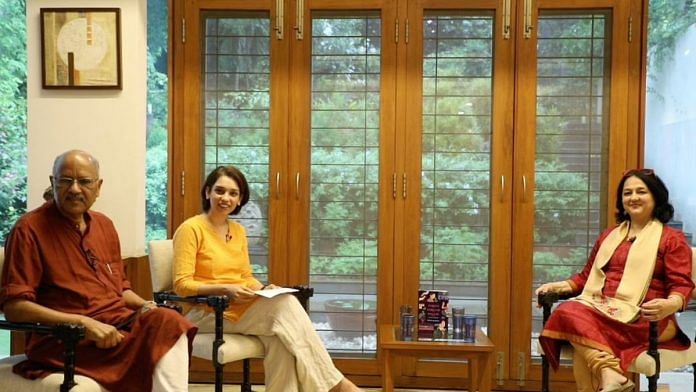New Delhi: Samaaj (society) is the foundational sector for which sarkaar (government), and bazaar (economy) were created to enable larger public interests, and all three must work together, said author and philanthropist Rohini Nilekani Friday.
Nilekani was in conversation with ThePrint’s Editor-in-Chief Shekhar Gupta and Senior Editor-Science Sandhya Ramesh, during a session of ‘Off The Cuff’.
She spoke about her new book, ‘Samaaj, Sarkaar, Bazaar: A Citizen-First Approach‘, the role of youth in politics, climate change and its impact, as well as gender inequality.
Nilekani said her book aims to promote public discourse on accountability of the state and the society. She also said that the youth should be involved in debates on India’s future because young people “being part of active citizenship” was important in a “democracy like ours”.
Also read: Gradual Agnipath introduction ‘wouldn’t have broken so many hearts, aspirations’ says CMIE MD
‘You cannot outsource good governance’
Nilekani also said, “I think we do need to look at more public policy and programmatic funding around helping young people to create institutions that build more social capital. But that’s one part of it, but I think it’s really up to civil society institutions to help develop this youth muscle to get involved, to get engaged. We need more debating clubs, we need more book clubs, we need more such things. There are lots of sports clubs and other such things, but I think we need more ways.”
Speaking about her work, she mentioned how they started a “portfolio” to work with young men and boys. “The idea being that you can’t even get women’s empowerment unless men themselves also feel empowered,” she said.
She explains, “What is the gap we need to fill so that all genders can reach their potential? What should society be doing? See, I always come from the samaaj lens, what can samaaj do more to help its own citizens, its own communities? And it’s been a very interesting journey. Men do feel a bit threatened, young men sometimes, and they struggle to see, what is our role? We are supposed to be providers but we ourselves feel insecure about the future of jobs, how fast things are changing…So it’s very important to create positive programs for young males in this country.”
“You simply cannot outsource good governance only to the government, it’s important for citizens to co-create good governance. If we don’t participate, we lose ground,” she said, highlighting the need to get involved in solving local issues.
She further pointed out how the youth is increasingly asking more and more questions and getting involved in debates around climate change, education and wealth inequality.
Need for philanthropy
Nilekani said philanthropy will always exist and it is something that even ordinary people do, not just billionaires.
She also mentioned how samaaj, sarkaar and bazaar came together during the pandemic to provide resources, and that “it was the best example of quick integration”. She said societies tolerate private wealth creation because they “assume that it will spur innovation, create jobs, and create better societies too”.
“Societies will tolerate runaway wealth creation only so long as that wealth appears to be working for society. Private wealth, so long as it is seen to be working for society, it’ll be tolerated,” she added.
Nilekani said the pandemic proved that the country has “the best public digital infrastructure in the world”, where people are both empowered digitally and come together for mutual aid.
“There is a great human capacity for empathy and co-existence and to do that the moral leadership of the samaaj has to come up,” she added.
Also read: Atomic energy cheaper than solar, wind for end consumers, says nuclear scientist Anil Kakodkar



